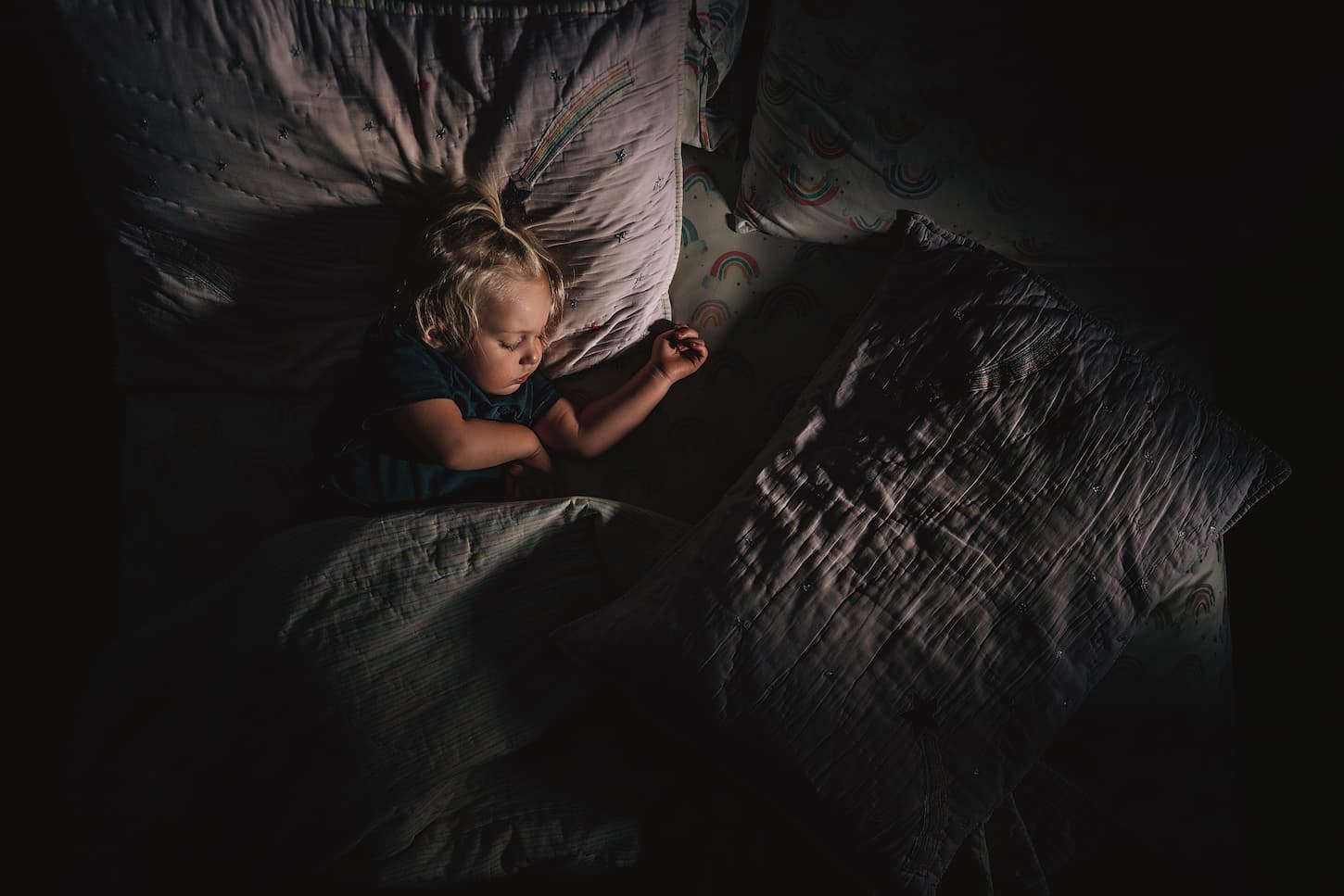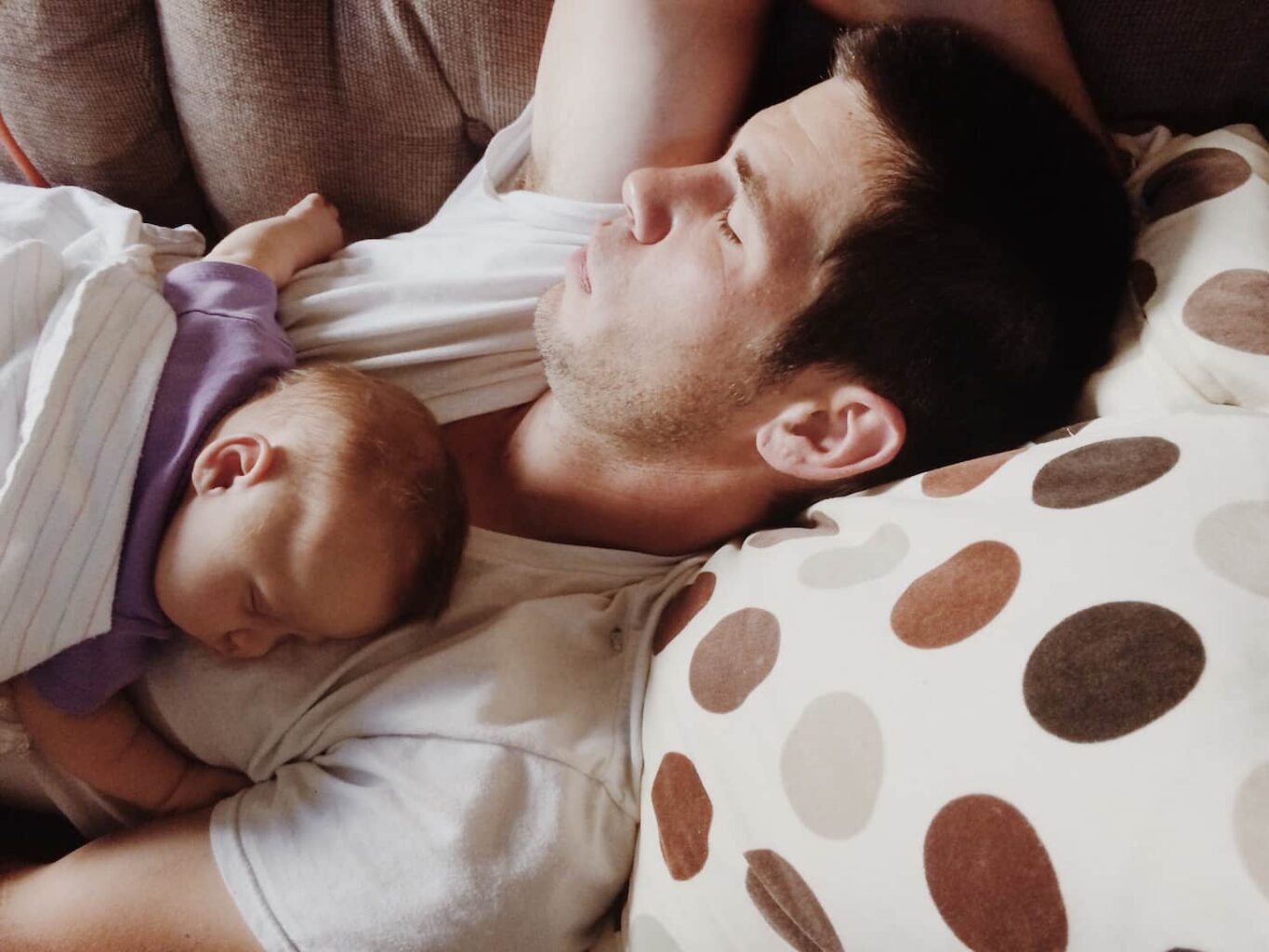A baby’s sleep pattern is never straightforward – it changes a lot over the first twelve months. One minute a baby will sleep fine for weeks, and out of nowhere, they suddenly have their parents up all night. So, why is a baby sleeping well during naps and not at night?
If a baby naps well but doesn’t sleep at night, it might have too many or too few naps during the day. A baby’s nighttime sleep may also be disturbed by changes in their routine, environmental disturbances, illness, or developmental milestones.
Babies and their sleep patterns can be unpredictable, and the best way to deal with erratic sleep is to know what can cause it. If you want to know more about why a baby naps fine but doesn’t sleep well at night, we’ll give you ten reasons below.

Why Does Baby Nap Well But Doesn’t Sleep at Night?
It’s hard for babies to stay awake for more than a few hours at a time, and they naturally nap during the day for short periods. Sleeping at night is different because babies wake up between sleep cycles, and if parents aren’t there to comfort them, they may find it hard to get back to sleep.
Newborn babies sleep a lot and wake up regularly during the night and day, but after 2-months old, babies get a sense of night and day, and they start to learn about nighttime sleeping.
Finding the balance between naps and night sleeping can be difficult at first. If babies sleep too much or too little during the day, they can be restless at night. A bad daytime nap schedule isn’t the only thing that will make a baby restless at night – many things can disturb a baby’s sleep.
Do you want to know more about why your baby isn’t sleeping well at night? Read this article I wrote: Baby Crying During Nighttime Checks? What to Do!
10 Reasons Why Your Baby Naps Well But Doesn’t Sleep at Night
A baby’s sleep pattern changes as they grow and develop in the first year. Many nighttime sleep problems are related to milestones such as teething and growth spurts. A baby might also wake up at night due to illness, hunger, or if something in their environment isn’t right.
If you have a baby who is waking a lot during the night but sleeps fine during the day, we’ve listed 10-reasons why they might be doing it below:
#1 – Your baby has negative sleep associations
From a young age, babies form habits especially around sleeping- these are called sleep associations. A sleep association is something a baby strongly associates with sleep, such as feeding.
Babies fall asleep easily when fed, but it will become a problem if a baby can’t fall asleep without being fed.
Sleep associations are negative or positive, and babies who have negative sleep associations are more likely to wake up during the night.
For example, feeding is a negative sleep association, along with rocking, holding, or walking the baby in a stroller to get them asleep – they’re negative because the baby can’t fall asleep without physical contact.
To help the baby sleep better at night, replace negative associations with positive ones. Positive sleep associations are ones where parents don’t give their babies physical contact to help them fall asleep.
Instead, parents should focus on a good bedtime routine, playing white noise, or calming their baby’s environment before bedtime.
Would you like to read more about negative sleep associations? Please read this article I wrote: How are Sleep Associations and Sleep Training Related?
#2 – Your baby can’t self-soothe
From around three or four months old, many babies can soothe themselves back to sleep without the help of their parents, and this is called self-soothing.
Learning how to self-soothe is a critical milestone for babies, and some are natural self-soothers, while others need to learn the skill. When a baby can self-soothe, they will become more independent and sleep better at night.
If a baby is three or four months old and you want to teach them how to self-soothe, start by allowing them to practice it. This means that as long as they don’t have an urgent need, parents can leave their little ones for a minute or two when they wake up before rushing in and soothing them.
Parents should never leave a newborn baby to cry, and if the baby is old enough, they can also teach them how to fall asleep independently with sleep training.
Babies are usually ready for sleep training from around six months old – depending on their development.
#3 – Your baby is hungry
It’s normal for a baby to wake up for feeding during the night, but if they wake up a lot because they’re hungry, they might not get enough calories during the day.
Here are the average amount of night feedings babies need according to their age:
- 0 – 2 months old: Need about 4 – 6 feedings per night.
- 3 – 4 months old: Need about 2 – 3 feedings per night
- 5 to 6 months old: Need about 1 – 2 feedings per night.
- 7-months and above: Most 7-month-old babies don’t need nighttime feeds, but some babies at this age will still wake up for one.
If a baby is waking up more than the average amount of times for feeding for their age group, give them enough food during the day.
Babies older than five months old can eat solids, which is a great way to fuel them up in the daytime, so they sleep better at night.
Parents can also help their baby feel full for the whole night if they give them a dream feed. A dream feed is when a baby is fed just before bedtime.
However, parents shouldn’t feed their baby too close to bedtime – it might become a negative sleep association, and babies don’t settle well on a full stomach.
Need more help with feeding info? We’ve got multiple articles, but these are the most popular.
- Do You Feed Baby When Sleep Training? (Plus 11 Tips)
- Sleep or Feed? How Long Can Babies Go Without Feeding?
#4 – Your baby is having too many or too few naps
One of the most common reasons a baby will nap well but be restless at night is having too many or too few naps.
If a little one has too much daytime sleep, they will be wide awake at night. If they have too little sleep, they will be overtired, making it hard for them to sleep.
Parents might think skipping a nap during the day will make their baby sleep better at night, but it has the opposite effect.
Overtired babies become highly stimulated by the stress hormone cortisol, which makes them anxious, and they will find it impossible to get to sleep.
Need nap help? Read our Sleep Training for Naps: a Complete Guide (with Q&A).
Here are the signs of an overtired baby:
- Rubbing their eyes and face.
- Turning their head away from lights, toys, and people.
- Yawning, sneezing, or hiccupping.
- Fussiness and lots of crying, which gets progressively worse.
- Clinginess.

#5 – There could be a problem in their environment
A baby might wake up regularly during the night if there’s a problem with their sleeping environment. For example, babies are susceptible to their surroundings and can wake up if their bedroom is too warm, bright, or noisy.
Babies sleep better in a cool environment, and the ideal sleeping temperature for babies is 68 – 72 degrees Fahrenheit or 20 – 22 degrees Celsius. If the temperature in the bedroom is ok, assess the area during the night to see if other things might potentially disturb the baby.
For example, noises from animals, neighbors, or security lights flashing on and off might disturb a baby’s sleep.
#6 – Your baby needs an earlier or later bedtime
After two or three months, a baby will start to get a sense of night and day, which means, unlike newborns, they should begin to sleep longer at night and less during the day.
However, if a baby goes to bed too early, they might wake up in the middle of the night ready to start the day. If bedtime is too late, they might wake up at night because they’re overtired.
To help the baby sleep better at night, experiment with different bedtimes. Then, after finding one which suits the baby, stick to it – babies will sleep better at a regular bedtime.
Here are the best bedtime for babies according to their age:
- 0 – 2 months – N/A
- 2 – 4 months – between 8 and 11 p.m.
- 4- 6 months – between 6 – 7:30 p.m.
- 6 – 12 months – between 6 – 8 p.m.
Earlier bedtimes are key. Read more about why that is in our guide here: Do Babies Sleep Better with Earlier Bedtime?
#7 – They’re going through a sleep regression
If a baby usually sleeps well but suddenly starts waking up regularly during the night – they might be experiencing a sleep regression. Sleep regression usually happens when a baby reaches significant development milestones, such as learning to sit up, walk or talk.
When babies learn new skills, they are so excited that it can keep them awake all night. Unfortunately, we can never predict when a sleep regression will happen, but many babies will go through them at four, eight, and eighteen months old.
During a sleep regression, parents should stick to their baby’s routine as much as possible.
Interested in learning more about sleep regressions? Please read this terrific article: Earlier Bedtimes: The Key to Managing Sleep Regressions.
#8 – Your baby might be ill
If a baby is lethargic, sleeping excessively during the day, and restless at night, they might be ill. Sick babies often sleep during the day and will usually be agitated during the night.
Obvious signs that a baby is waking up because they’re ill, aside from crying, is if they also have vomiting, diarrhea, abdominal pain, sniffling, or a temperature. If you think your baby is sick, seek advice from your healthcare professional.
# 9 – Your baby might be teething
Teething is a normal part of a baby’s development, and some babies glide through teething with few symptoms, while others have a traumatic time getting their teeth through.
Teething babies often wake up at night, but there is no evidence to say teething pain is worse in the evening. It only seems worse because babies are more sensitive to pain if it disturbs their sleep.
Most babies get their first teeth around four or five months old, then again at six, ten, fifteen, and twenty-five months old. After that, teething happens in two stages, chronic and acute.
Chronic teething can last several weeks, but with acute teething, the painful process of the teeth coming through the gums – usually only lasts two or three days.
Here are some signs that your baby is teething:
- Drooling.
- Excessive chewing.
- Swollen, inflamed gums.
- Sleep disturbances.
- Flushed face.
- Irritability.
- Pulling ears.
- In severe cases, there can be vomiting and diarrhea.
#10 – Your baby might be going through a growth spurt
Babies grow in short, intense bursts and can have up to ten growth spurts in their first year. During a growth spurt, babies need more sleep and calories, so they often sleep more during the night and day but will usually wake up during the night for extra feeding.
If a baby is suddenly ravenous, emotionally sensitive, and sleeps a lot but wakes up more during the night for feeding, they’re probably going through a growth spurt. Most babies usually have growth spurts for around three days to a week.

Do Daytime Naps Affect Night Sleep for Babies?
Daytime naps have a huge impact on a baby’s sleep. If a baby naps too much during the day, they might find it hard to sleep at night. If they don’t have enough naps, they might not sleep because they’re overtired. Usually, under-tired babies are easier to manage than overtired ones.
Please look at the table to better understand the best amount of daytime and nighttime sleep for babies according to their age.
| Baby’s Age in Months | # of Daytime Naps | Hours of Daytime Sleep | Hours of Nighttime Sleep | Total Hours of Sleep |
|---|---|---|---|---|
| 0 – 2 | 4 – 5 | 8 – 9 | 8 – 9 | 16 – 18 |
| 2 – 4 | 4 | 4 – 6 | 9 – 10 | 14 – 16 |
| 4 – 6 | 3 | 4 – 5 | 9 – 10 | 14 – 15 |
| 6 – 12 | 2 – 3 | 3 – 4 | 10 – 11 | 14 |
To help the baby sleep better at night, once parents have a good nap routine in place, stick to it as much as possible – keep nap times regular, and don’t let the baby nap too late in the afternoon.
If little ones nap too late in the afternoon, they might struggle to sleep at night.
Why Is My Baby So Restless at Night?
Babies wake up regularly during the night and might move around their crib or cry between their one-hour sleep cycles – this is normal. However, if a baby is restless all night long, it might indicate that something with their health, environment, or sleep routine isn’t right.
Two common sleep disorders can cause children to be restless at night: sleep apnea and restless leg syndrome.
If you think your baby has restless leg syndrome or sleep apnea, seek advice from a medical professional.
Sleep Apnea
Sleep Apnea affects a baby’s airways and breathing and is caused by an obstruction or a narrow airway. In children, the obstruction is usually enlarged adenoids or tonsils.
As a result, babies with sleep apnea are often restless at night and sleepy during the day. Other symptoms include mouth breathing, snoring, coughing, and pauses in their breathing.
Restless Leg Syndrome
Restless leg syndrome is when a baby has a strong urge to move their legs, usually because of pain or discomfort. Restless leg syndrome symptoms can occur every time the baby is inactive but are more apparent at bedtime.
Babies with restless leg syndrome usually find it hard to fall asleep and will erratically move their legs in discomfort at bedtime and during the night.

Key Takeaways and Next Steps
If parents want their baby to sleep better at night, they need to ensure the baby gets the right amount of naps for their age group and stick to a sleeping schedule.
If the baby depends on negative sleep associations at bedtime, such as feeding, replace them with positive ones like a strong focus on their bedtime routine.
For babies three months and above, parents can teach them how to self-soothe to help them sleep better at night.
Would you like to learn more about how to sleep train a baby? Read these wonderful articles that I have written:
- Does Sleep Training Change A Baby’s Demeanor?
- How to Sleep Train When Baby is Teething?
- How to Sleep Train Your Baby: a Complete and Helpful Guide.
- Guide: How to Maintain Sleep Training When Baby Is Sick.
Resources
Learning about parenting or sleep training techniques is important to learn from various reputable sources. These are the sources used in this article and our research to be more informed as parents.
- “Default – Stanford Children’s Health.” Stanford, www.stanfordchildrens.org/en/topic/default?id=infant-sleep-90-P02237. Accessed 30 June 2022.
- DeJeu, Emily. “Baby and Toddler Bedtimes By Age – An Easy Reference Chart from The Baby Sleep Site®.” The Baby Sleep Site – Baby / Toddler Sleep Consultants, 28 Dec. 2021, www.babysleepsite.com/baby-sleep-needs/baby-toddler-bedtime-chart.
- Dewar, Gwen. “Dream Feeding: An Evidence-Based Guide to Helping Babies Sleep Longer.” PARENTING SCIENCE, 11 Mar. 2022, parentingscience.com/dream-feeding.
- “Infant Sleep Problems: A Troubleshooting Guide.” PARENTING SCIENCE, 11 Mar. 2022, parentingscience.com/infant-sleep-problems.
- “How Much Sleep Do Infants Need? An Age-By-Age Guide.” Verywell Family, 7 Apr. 2022, www.verywellfamily.com/is-my-baby-sleeping-too-much-284561.
- “Pediatric Obstructive Sleep Apnea – Symptoms and Causes.” Mayo Clinic, 3 Oct. 2020, www.mayoclinic.org/diseases-conditions/pediatric-sleep-apnea/symptoms-causes/syc-20376196.
- “Signs Your Child Is Hungry or Full.” Centers for Disease Control and Prevention, 22 July 2021, www.cdc.gov/nutrition/infantandtoddlernutrition/mealtime/signs-your-child-is-hungry-or-full.html.
- “Sleep and Restlessness.” Pediatric Associates of Richmond, 28 Jan. 2021, parpeds.com/library/restlessness-and-sleeping.
- “When Should Your Baby Sleep Through the Night?” Verywell Family, 6 Nov. 2021, www.verywellfamily.com/baby-sleep-schedules-2634259.
